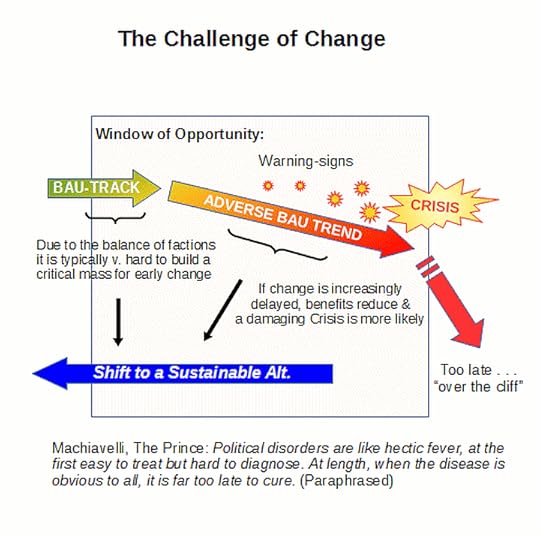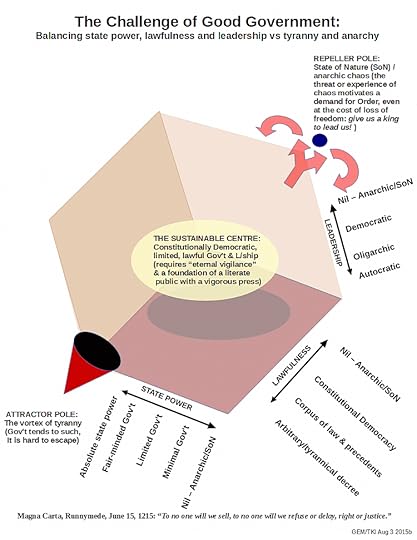Michael J. Behe's Blog, page 541
January 13, 2019
Site was down for some hours overnight
Technical issues. Sorry for inconvenience. – News
Copyright © 2019 Uncommon Descent . This Feed is for personal non-commercial use only. If you are not reading this material in your news aggregator, the site you are looking at is guilty of copyright infringement UNLESS EXPLICIT PERMISSION OTHERWISE HAS BEEN GIVEN. Please contact legal@uncommondescent.com so we can take legal action immediately.
Plugin by Taragana
January 12, 2019
Heard at The Conversation: Enough with the “war on science” rhetoric!

A group of communications profs says it has the opposite of its intended effect:
National Geographic’s March 2015 cover story provided a thoughtful discussion around the question of “Why Do Many Reasonable People Doubt Science?” The actual cover, however, simply said “The War on Science.”
That article never actually uses the term “war on science” but claiming the existence of a such a conflict has become quite common.
There are books to tell readers “who’s waging it,” “why it matters,” and “what we can do about it” and many opinion articles and editorials in reputable publications describing its battles. …
… our new research suggests that Americans may see scientists’ choice to accuse conservatives of waging a “war on science” as relatively aggressive compared to potential alternative ways of describing the current situation. In turn, this perceived aggressiveness may harm the credibility of scientists in conservative audiences that already have doubts about them. John C. Besley et al., “Calling it a ‘war on science’ has consequences” at The Conversation
Well yes, of course. For one thing, it takes no very wide reading to discover that there are huge problems right now with the way research is conducted and evaluated. Check out Retraction Watch.
Despite that, silly studies are done and publicized as to why the public supposedly doesn’t trust science, as if some benefit would be gained if we trusted what often doesn’t sound trustworthy, and turns out not to be.
Toning down the rhetoric might at least suggest a willingness to listen.
Prediction, alas: Our communications profs will discover, soon enough, that the rhetoric is mostly not aimed at solving the problem but at making the people indulging in it feel superior. It is likely to continue because it will continue to make them feel good.
See also: From Chemistry World: Forensic science is “in crisis”
A study of the causes of science skepticism sails right by the most obvious cause of skepticism: Repeated untrustworthiness
and
Which side will atheists choose in the war on science? They need to re-evaluate their alliance with progressivism, which is doing science no favours.
Follow UD News at Twitter!
Copyright © 2019 Uncommon Descent . This Feed is for personal non-commercial use only. If you are not reading this material in your news aggregator, the site you are looking at is guilty of copyright infringement UNLESS EXPLICIT PERMISSION OTHERWISE HAS BEEN GIVEN. Please contact legal@uncommondescent.com so we can take legal action immediately.
Plugin by Taragana
Worms challenge idea that complexity just arises from simplicity
 arrow worm (chaetognath)/Zatelmar ( CC BY-SA 3.0 )
arrow worm (chaetognath)/Zatelmar ( CC BY-SA 3.0 )Maybe it’s the other way around in many cases. The arrow worm has recently been placed on the “evolutionary tree” in a way that is creating a challenge. Japanese scientists have decided that the two hundred or so species of arrow worm belong to a group that consists of much simpler organisms than themselves:
“Arrow worms are predators, they have nervous systems, they have developed sensory organs; but the other organisms they’re grouped with are much simpler,” says molecular geneticist and first author Ferdinand Marlétaz.
“If you place arrow worms here, it means there was probably a lot of independent simplification, rather than the independent emergence of complexity.”Nick Carne, “Weird worms challenge complexity argument” at Cosmos
Of course, if all members of the group were complex from a very early time, that would mean … we don’t go there. Just think, there was a time when anyone could recite a Darwinian explanation for everything in their sleep. Sweet dreams.
See also: Worm gives up sexual reproduction, loses 7000 genes
Giant Shipworm Found Alive Is Example Of Devolution
and
GMO Bacteria: Devolution Is An Evolutionary Advantage?
Devolution: Getting back to the simple life
Copyright © 2019 Uncommon Descent . This Feed is for personal non-commercial use only. If you are not reading this material in your news aggregator, the site you are looking at is guilty of copyright infringement UNLESS EXPLICIT PERMISSION OTHERWISE HAS BEEN GIVEN. Please contact legal@uncommondescent.com so we can take legal action immediately.
Plugin by Taragana
Mike Behe’s new book, Darwin Devolves: “Absolutely convincing” or “omits contrary examples”
 From two people, from very different perspectives. First, German biologist Wolf-Ekkehard Lönnig, formerly of the Max Planck Institute, comments on Michael Behe’s new book, Darwin Devolves (February 26, 2019):
From two people, from very different perspectives. First, German biologist Wolf-Ekkehard Lönnig, formerly of the Max Planck Institute, comments on Michael Behe’s new book, Darwin Devolves (February 26, 2019):
Regarding the evolution of the systematic categories in question (the finches, for instance, and others), I urge you to check out Behe’s new book. Incidentally, I must admit that I was fascinated that he has come to virtually the same conclusion as I have. Yet he has done so by a totally different approach. (See my book, in German, about Species Concepts, Evolution and Creation.) Concerning the eye, as I have written and as I note that Behe agrees, Darwinian theory substitutes imagining for reasoning. In affirming this, Dr. Behe’s analyses are stunning and absolutely convincing.
Apart from further intriguing comments on Lenski’s famous investigations on bacteria, you will also find deep insights on the multiverse theory, complexity theory, self-organization theory, evo-devo, niche construction, developmental plasticity, natural genetic engineering, the machinery of splicing, major transitions in evolution, game theory, and more. Wolf-Ekkehard Lönnig, “Behe’s New Book, Darwin Devolves — Stunning and Absolutely Convincing” at Evolution News and Science Today:
Readers may recall Wolf-Ekkehard Lönnig from the carnivorous plants stories, for example, Geneticist W.-E. Loennig Replies To Darwinist Nick Matzke: Which Is More Important: Darwin or Facts?
Nathan Lents, author of Human Errors: A Panorama of Our Glitches, from Pointless Bones to Broken Genes, was struggling to read the book as well:
I’ve been commissioned to review Behe’s new book, out next year, so I am reading it now. I’m about 70 pages in and so far, all I’ve seen is, “Gee, this stuff is complicated!” I am hoping it gets better because supposedly Behe is the best of their bunch. Ken Miller thinks highly of him, despite their public tussles. He better get somewhere fast in this book or I don’t think I will accept the commission to review it because there’s nothing to review! Nathan H. Lents, “Reviewing Behe’s “Darwin Devolves”” at Peaceful Science
The post is dated October 25, 2018. Lents did finish reading the book, apparently, and later admitted, (November 23, 2018)
I’ve now finished the book and I agree that it was more than that and it did make its way to some good scientific discussions of how mutations can effect beneficial change by diminishing or destroying function to a gene/protein. Unfortunately, in my reading, Behe completely omits mention of examples that are contrary to this and that’s what is frustrating for us.Nathan H. Lents, “Lents and Swamidass: Our Questions for Behe’s Darwin Devolves” at Peaceful Science
Readers may also recall Nathan Lents, author of Human Errors: A Panorama of Our Glitches, from Pointless Bones to Broken Genes, from “Nathan Lents Is Still Wrong About Sinuses But Is Still Writing About Them
We’ll have more on the book soon.
See also: A peek at Mike Behe’s new book, Darwin Devolves
And what, the carnivorous plants? Oh yes, here:
Remember that Darwin-eating plant? Now threatening to eat Darwinian Nick Matzke …
Carnivorous plants: After eating Darwin, they couldn’t resist further culinary adventures
The plants that eat vertebrate animals
Carnivorous plants: The 200-year headache.
Follow UD News at Twitter!
Copyright © 2019 Uncommon Descent . This Feed is for personal non-commercial use only. If you are not reading this material in your news aggregator, the site you are looking at is guilty of copyright infringement UNLESS EXPLICIT PERMISSION OTHERWISE HAS BEEN GIVEN. Please contact legal@uncommondescent.com so we can take legal action immediately.Plugin by Taragana
Jerry Coyne: Just sign Chicago “Statement on Principles of Free Expression”

Darwinian biologist Jerry Coyne, author of Why Evolution Is True, as a newly minted free speech warrior, has started to look critically at claims that university students need to be “protected” from threatening ideas:
Several dozen American universities have adopted the “Chicago Principles,” our university’s “Statement on Principles of Free Expression,” which is the most liberal speech “code” in the U.S. It’s basically the First Amendment applied to the campus of a private university, and in my view it’s an unalloyed good. But of course there’s a movement against free speech on many campuses, for it is said to permit “hate speech” (often construed as “speech that I don’t like”), or to constitute some sort of danger or harm to students.
One of the resisting campuses has been Williams College in Massachusetts, widely recognized as one of the best undergraduate liberal-arts schools in America.
As I’ve reported before (see here and here), a faculty proposal to adhere to the Chicago Principles has been met with stiff resistance by other faculty and by students, who say that the principles enable hate speech and racism, as well as lacking the “nuance” needed by Williams College—but not apparently by schools like the University of Chicago and Princeton. Jerry Coyne, “William College gives charge to committee about adopting the Chicago Principles” at Why Evolution Is True (blog)
Good for him but what will be really interesting to see now is how many of his fellow Darwinian evolutionary biologists join him in protest. People tend to think the mob is coming for someone else, someone who “deserves” it.
People who take this stance can’t also be trying to prevent ID-based theories from getting a hearing on principle. And Coyne has not been a friend of intellectual freedom in the past.
Cf Jerry Coyne denounces Mike Behe’s book unread It’s not even like he wouldn’t have time to read it. He’s retired.
See also: Darwinian Jerry Coyne as free speech warrior Coyne, if you’re not careful, you’re going to end up with Sam Harris, Jordan Peterson, and Bret Weinstein on the dark internet, where Cool people can say or imply anything they like about you and hordes of the angry aggrieved can feel good about shouting you down. Good for you if it happens but count the cost.
Evolutionary biologist tries to gather shards of truth The trouble is, as Rob Sheldon has pointed out, “ Despite the pain they feel, Darwinists don’t seem to realize it is their own hands that have torn down the edifice of knowledge. They still think that discrimination is valid when they are in charge, that courtesy is only for friends, that objectivity is their personal possession.”
Maybe The “March For” Fad Will Die Out Before The Anti-Semitism Hits Science Coyne is concerned about anti-Semitism. He’d be a fool if he weren’t because he is—as he discusses on his blog—he is Jewish himself. Znut it’s part and parcel of the Social Justice Warrior movement as it really is, not as people may think it should be or hope it is.
and
Jerry Coyne is learning, but not fast enough (about anti-Semitism among the social justice warriors (SJWs, the marching Woke) (Update: From the looks of things, he is learning faster now. He must have got round to reading his mail or something.)
Copyright © 2019 Uncommon Descent . This Feed is for personal non-commercial use only. If you are not reading this material in your news aggregator, the site you are looking at is guilty of copyright infringement UNLESS EXPLICIT PERMISSION OTHERWISE HAS BEEN GIVEN. Please contact legal@uncommondescent.com so we can take legal action immediately.
Plugin by Taragana
SM: Is the slippery slope argument ALWAYS fallacious?
In the fallacy thread, Scuzzaman has raised the issue of the slippery slope argument, which he argues is not necessarily fallacious. Let’s pause for a vid (without necessarily endorsing all that is said, this is food for thought):
Benjamin McLean here connects the issue to the principle of induction and so also to the post-Hume challenge to inductive reasoning. In short, a slippery slope argument is an inductive causal inference from present and past experiences, trends and dynamics to a possible future, inviting us to turn away before it is too late. As in:

When we cast the argument in this form, we can then see some of the force in SM’s point:
[SM, 77:] The OP [on fallacies] is deficient in reference to the Slippery Slope argument.
Not even the people making the argument 50 years ago would have given credence to legislatures forcing schools to let boys dress as girls and therefore – due to their stated opinion in opposition to their plain biology – be allowed entry to the girls bathroom, i.e. they had no possible clue as to the probabilities involved and nor in principle could they have.
Here in Germany several years ago the State decided that Germany should join the rest of the EU in explicitly banning sex with animals (although one should note, not as inherently deranged behaviour but as an affront to the rights of the animal). Announcement of this intention was followed by a public protest by over 200 literal “animal lovers” and their animals, claiming the contrary right to their previously legal practice.
Nobody ever made the argument based on the probability of Step 10 occurring in the context of the culture and mores at the time of Step 1. But the Overton Window is merely another description of the Slippery Slope: it describes not only the fact that certain subjects, facts, and opinions are officially forbidden or mandatory, but also that these categories are not only malleable but are actively manipulated over time in order to degrade public opposition to the managerial classes’ excesses.
We have overwhelming warrant from history to presume, a priori of any particular current demonstration, that no political action is ever solely what it appears and that long-term agendas inimical to our collective and several interests are perpetually being advanced. The “Boiling the Frog” illustration is also merely another version of the Slippery Slope argument. They all three (Slippery, Overton, and Frog) exist as common wisdom because the phenomenon they describe IS so common as to be inescapable.
Are misapplications of the argument possible?
Well, duh.
That doesn’t make the argument a fallacy, or else all forms of argument are fallacious.
The obvious issue here is, is there a ratchet effect that tends to strengthen and accelerate a damaging trend? If that obtains, it can be harder and harder to stop a slide down the slope, even if signs of a ruinous result are increasingly evident.
That is, the cogency of a slippery slope argument depends on the strength of its ratcheting mechanism. If one is present and is arguably strong, “a stitch in time saves nine.” However, as the change challenge diagram illustrates, it is often very hard to build a critical mass of support to act in good time, and as Machiavelli long since observed, by the time the course of a destructive policy disorder is manifest to all, it is too late to cure.
(And yes, that is a key part of why democratic forms of government are inherently unstable and must be stabilised through cultural forces that build a critical mass of support for prudence. Where, also, business as usual is so precisely because it is what those who hold the balance of power want or will tolerate.)
This brings up the Overton Window issue:

Here, we see an illustration of how power balances and support for policy can move across time. Where, proverbially, elections are won in the middle, through the swinging vote (and sometimes through disaffection of supporters who do not support one who would naturally be their candidate save for some issue or scandal X). In that context there are two BATNA points, where a critical mass will reject a proposal beyond that threshold, swinging the balance of voters or policy makers decisively against the relevant perceived radical faction.
So, the issue is, is there a ratchet on the BATNA, pushing it to one side or the other? If so, how strong is it and where will it lead? Can it be broken, swinging the trend the other way?
These may be quite difficult questions to answer, but they clearly show that the real fallacy is the trend to use “slippery slope” as a thought-stopping, dismissive talking point.
Especially, when the lessons of sound history (not victory propaganda) were bought with blood and tears; so those who neglect, reject or dismiss them doom themselves to pay the same coin over and over and over again. END
PS: It is worth a pause to again draw attention to the reason why constitutional democratic government is inherently unstable and must be stabilised by the consistent action of a prudent, well informed, vigilant public:
 U/d b for clarity, nb Nil
U/d b for clarity, nb NilCopyright © 2019 Uncommon Descent . This Feed is for personal non-commercial use only. If you are not reading this material in your news aggregator, the site you are looking at is guilty of copyright infringement UNLESS EXPLICIT PERMISSION OTHERWISE HAS BEEN GIVEN. Please contact legal@uncommondescent.com so we can take legal action immediately.
Plugin by Taragana
January 11, 2019
The amoeba that might be smarter than your computer

Hype aside, the microbe’s math skills ace the Travelling Salesman problem and may help with cybersecurity
Each channel represents a city on the “salesman’s route” with lights going off that signal how far each next “city” is.
This might seem like a roundabout way of calculating the solution to the traveling salesman problem, but the advantage is that the amoeba doesn’t have to calculate every individual path like most computer algorithms do. Instead, the amoeba just reacts passively to the conditions and figures out the best possible arrangement by itself. What this means is that for the amoeba, adding more cities doesn’t increase the amount of time it takes to solve the problem. Avery Thompson, “A Single Cell Hints at a Solution to the Biggest Problem in Computer Science” at Popular Mechanics
The thinking if, if we could figure out just how the brainless amoebas do these calculations, we might be able to use that information to speed up problems that are difficult because they use up a lot of computational power, including cybersecurity problems, which the amoebas do not seem to require.
Apart from solving computer science problems, the amoebas’ skills raise some interesting questions. Though we don’t know how, we know that some type of intelligence can exist without a brain, as the slime mold has demonstrated in other experiments, reminiscent of the Travelling Salesman problem, as well… Denyse O’Leary, “Is an amoeba smarter than your computer?” at Mind Matters
Nature is full of intelligence but mostly it does not resemble human intelligence. In some ways it works better than computer intelligence.
See also: See also: Can plants be as smart as animals?
Copyright © 2019 Uncommon Descent . This Feed is for personal non-commercial use only. If you are not reading this material in your news aggregator, the site you are looking at is guilty of copyright infringement UNLESS EXPLICIT PERMISSION OTHERWISE HAS BEEN GIVEN. Please contact legal@uncommondescent.com so we can take legal action immediately.
Plugin by Taragana
Be more afraid of the hype vendors than of the AI

The release of the Top Ten over hyped AI stories of 2019 has led the way for further promising ones, including this one, says engineer and philosopher Jonathan Bartlett:
Was the machine cleverand sneaky or was it just programmed wrong? You decide.
First, just to be clear, at Mind Matters we have nothing against AI. Quite the opposite, our writers include professors at the forefront of AI research. But we do have something against AI hype. Media seemingly can’t help portraying today’s high-tech world as a remake of I, Robot (2004), starring you and me. One result is that some members of the public may completely misunderstand what AI is and does.… TechCrunch published an article on December 31, 2018, with the title, “This clever AI hid data from its creators to cheat at its appointed task,” advising, “Depending on how paranoid you are, this research from Stanford and Google will be either terrifying or fascinating.” The article details an actual incident from 2017 but the mundane occurrence seems to have morphed into science fiction. Jonathan Bartlett, “It’s 2019: Begin the AI Hype Cycle Again!” at Mind Matters
 Jonathan Bartlett
Jonathan BartlettJonathan Bartlett is the Research and Education Director of the Blyth Institute.
Also by Jonathan Bartlett: How can information theory help the economy grow
and
Google Search: Its secret of success revealed: The secret is not the Big Data pile. No, Google found a way to harness YOUR wants and needs
See also: The Top Ten over hyped AI stories of 2019
Copyright © 2019 Uncommon Descent . This Feed is for personal non-commercial use only. If you are not reading this material in your news aggregator, the site you are looking at is guilty of copyright infringement UNLESS EXPLICIT PERMISSION OTHERWISE HAS BEEN GIVEN. Please contact legal@uncommondescent.com so we can take legal action immediately.
Plugin by Taragana
Dark matter puzzle depends in part on whether our galaxy is an “outlier”
 Milky Way, artist’s impression/NASA/JPL-Caltech/ESO/R
Milky Way, artist’s impression/NASA/JPL-Caltech/ESO/R
Twenty years ago, astronomers couldn’t find enough satellite galaxies orbiting the Milky Way. Now there seem to be too many. Some information seems to be missing. A possible solution is that many of these galaxies are dwarfs formed by dark matter:
Most cosmologists believe that dark-matter particles are “cold,” meaning that they move slowly. Because of this, they can coalesce into numerous tiny halos, providing scores of places where dwarf galaxies can form. But “warm” or “hot” dark matter, which by definition moves faster, cannot coalesce so easily. In fact, hot particles wouldn’t be able to form mini-halos at all. So the sheer existence of these small galaxies is a sign that warm dark matter is likely not at play. “It’s very bad news for alternative dark-matter scenarios,” Bullock said. “They’re just dead on arrival.”
And the importance of that cannot be underestimated. “This is the big Holy Grail — to try to pin down what the particle properties of dark matter are so that we can understand this missing component of the universe,” said Alex Drlica-Wagner, an astronomer at the Fermi National Accelerator Laboratory.
And it comes at a crucial time. Willman admits that she had started to wonder whether scientists would ever be able to truly use these tiny galaxies to learn something fundamental about dark matter. Shannon Hall, “Missing Galaxies? Now There’s Too Many
” at Quanta
The trouble is, as the article goes on to point out, our galaxy may be an outlier. Like ourselves, maybe.
See also: Does An Arrested Galaxy Violate The Second Law Of Thermodynamics?
Our Milky Way Galaxy Is Twice As LargeAs Previously Thought?
Experimental physicist Rob Sheldon takes issue with News’s globular clusters story Sheldon: A physics model is always incomplete. Some missing piece of trivia will turn out to be important. So always take models, even elaborate expensive super-computer models, with many grains of salt. They are only as good as the assumptions that go into them.
and
Are globular clusters 4 billion years younger than previously thought? It “brings into question” more than the mechanics of galaxy formation. There is considerable distance between nine billion years and thirteen billion years. An equivalent claim for life on Earth would shave a billion years off the development of life. If it’s true, it’s true. But the finding doesn’t fill onlookers with confidence about the accuracy of dating systems.
Follow UD News at Twitter!
Copyright © 2019 Uncommon Descent . This Feed is for personal non-commercial use only. If you are not reading this material in your news aggregator, the site you are looking at is guilty of copyright infringement UNLESS EXPLICIT PERMISSION OTHERWISE HAS BEEN GIVEN. Please contact legal@uncommondescent.com so we can take legal action immediately.
Plugin by Taragana
Did fatness rule the Stone Age?
 Willendorf Venus/Matthias Kabel
Willendorf Venus/Matthias Kabel
Sapiens is an interesting new mag and podcast that tries to make paleontology, archaeology, and anthropology interesting and relevant. Hence, a look at the current concerns about obesity—now worldwide due to the spread of media—from a Stone Age perspective (think Willendorf Venus, 28,000 BCE – 25,000 BCE).
Not all Stone Age Venus figurines, of which 200 have been found, were fat. But then there were the Fat Ladies of Malta…
The Venus figurines, the Fat Ladies of Malta, and the Fat Lord and Frog suggest that some fat people were held in high esteem in past cultures and that the societies from which they emerged may have believed that fatness is goodness—or at least that there is nothing wrong with being fat.
I suspect some degree of fatness has been present in all human societies, except for those on the brink of survival or living in truly extreme environments. I suspect that obese people have been sometimes revered, sometimes reviled, and perhaps sometimes just accepted without shame. But recent ethnographic research in Fiji and elsewhere strongly suggests that cultural attitudes toward fatness are less diverse now than they were in the past.STEPHEN E. NASH, “Who Decided It Was Bad to Be Fat?” at Sapiens
It doesn’t seem as though much has changed over 25 millennia except that many more people have much more to eat. So fatness wouldn’t signify success in more modern cultures.
What’s really fascinating is that, with so much more archaeology, we know so much more about the past.
See also: Toxic Snow Has Claimed Stone Age Artwork: Willendorf Venus Banned From Facebook
and
Larry Moran Asks Whether Evolutionary Psychology Is A “Deeply Flawed” Enterprise (genuine, non-banned Willendorf Venus content)
Follow UD News at Twitter!
Copyright © 2019 Uncommon Descent . This Feed is for personal non-commercial use only. If you are not reading this material in your news aggregator, the site you are looking at is guilty of copyright infringement UNLESS EXPLICIT PERMISSION OTHERWISE HAS BEEN GIVEN. Please contact legal@uncommondescent.com so we can take legal action immediately.
Plugin by Taragana
Michael J. Behe's Blog
- Michael J. Behe's profile
- 219 followers



